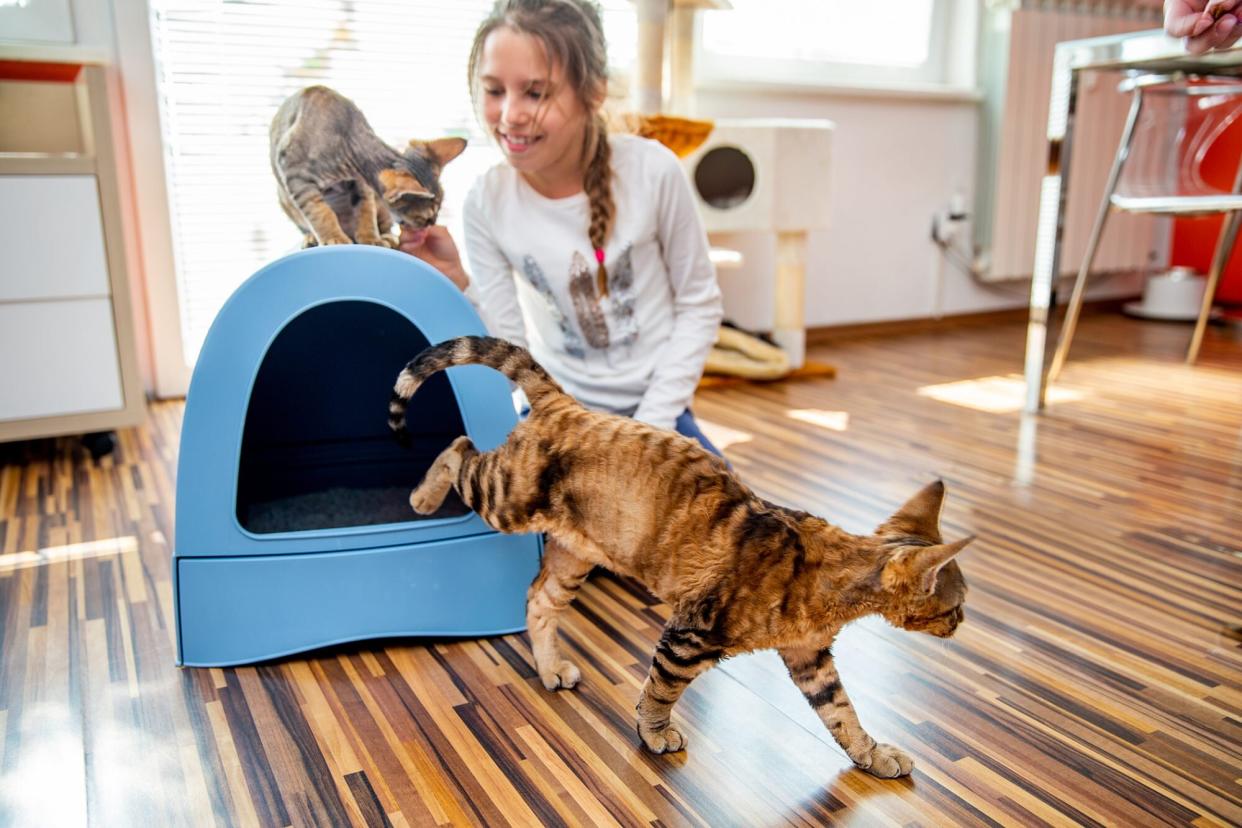How Often Should Cats Poop? Learn if Your Cat Is Regular and What To Do if They're Not

Casarsa Guru / Getty
If you co-raise your cat, chances are you've exchanged more than one text about the timing, location, or consistency of your pet's poop (guilty!). And if you're a solo cat parent, we feel for your BFF that may have been subjected instead (guilty, again).
What happens between the time your cat eats and when she visits the litter box can be somewhat of a mystery. And normal cat poop, well, what exactly does that even look like? And how often should cats poop, anyhow?
There are so many factors that play a role in your cat's digestion. So, there's no exact number when it comes to how often a day your cat should poop, Carling Matejka, DVM, and spokesperson for Solid Gold tells Daily Paws. "Usually, cats will defecate once to twice a day." More important than the number of times your cat goes—noting any changes in frequency or consistency.
How Often Should Healthy Cats Poop?
Healthy cats poop about one to two times a day following a meal's approximate 12- to 20-hour journey through the digestive tract. But the amount of time it takes for a cat's meal to go from bowl to litter box, and how many times she goes, depends on several factors.
Diet
From kibble and wet food to raw—what your cat eats has an impact on how often she poops. "A high-carbohydrate dry kibble diet results in more bowel movements," Matejka says. Wet and raw diets have higher digestibility ratios, which means fewer bowel movements than a kibble-fed feline. And any diet low in fiber could back your kitty up and result in less frequent bowel movements.
Stress
Moving, introducing a new family member, or even a trip to the vet can all throw your cat's bathroom routine out of whack, particularly in anxious cats.
Parasites
Digestive parasites irritate the GI tract, causing waste to move through it too fast (AKA diarrhea). Be on the lookout for worms or segments in your cat's poo, and don't skip your cat's yearly preventive fecal test.
Food Allergies and Intolerance
Other culprits for loose stool include food allergies and dietary intolerances, which can disrupt a cat's regular bathroom schedule.
Health Conditions
Other health conditions such as irritable bowel syndrome, hyperthyroidism, kidney conditions, and obstructions can all lead to more or fewer bowel movements in cats.
All these digestive factors have one thing in common: they play a role in the balance of your cat's gut microbiome. "A cat's microbiome is a combination of hundreds of different microorganisms that help aid in digestion, attack harmful pathogens, and continuously communicate with the brain," Matejka says. "A healthy gut microbiome plays a role in both producing a normal bowel movement and overall health and disease prevention."
RELATED: Probiotics for Cats: What They Are and Vet-Recommended Picks
What Does Normal Cat Poop Look Like?
Hear me out—it's a good idea to examine your cat's poop before tossing it. Cat poop can tell you a lot about your cat's health. Ideal cat poop should be dark- to medium-brown, log-shaped, and formed but not too firm or too dry, adds Yui Shapard, BVM&S, MRCVS, Medical Director for Pawp.
Constipated: Lumpy, segmented, or hard clumps indicate your cat is constipated.
Normal: Normal cat poop should always be brown in color and either smooth and long like a snake or with a few cracks on the surface. It likely has a mild smell, but it shouldn't be overwhelmingly stinky.
Loose: Loose stools can range from soft blobs to liquid with no solid pieces.
Shapard adds that any stool with mucus or unusual coloration (tan, green, red, black, or white) all call for monitoring and a chat with your vet.
RELATED: Do Cats Fart? All About Flatulence in Cats
How Long Can a Cat Go Without Pooping?
You can tell if a cat is constipated if they are straining to poop, vomiting after trying to go, or if the stool is hard or unusually small (less than a few inches). Defecating outside the litter box may also be a sign of constipation (as well as other health problems).
If three days have passed since scooping poop from the litter box, it's time to schedule an exam. "Constipation can lead to obstipation, which is an emergency and requires immediate medical intervention," Shapard says. So, schedule a visit before trying at-home remedies for kitty constipation.
What If My Cat Poops More Than Twice a Day?
The vets agree—it's okay if your cat doesn't poop every day, or if they poop more than once a day. If your cat has always defecated less than once a day or more than twice a day and "the stool itself has a healthy color, size, and consistency, and the cat is not showing any change in its demeanor or any concerning symptoms, then this is likely less of a concern," Shapard says.
RELATED: Why Do Cats Bury Their Poop?
When to See Your Veterinarian
Off-colored stool, a lack of poo, watery poo, straining to go, or pooping outside the litter box is always a good reason to see your veterinarian. Generally, if the consistency, frequency, coloration, or location where your cat is pooping seems worrisome, call your vet for care. Your cat will thank you (eventually!).

